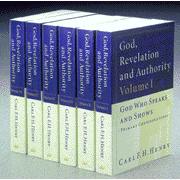Propositions and Logic - Rodney Decker
 “Although some biblical scholars (and some evangelicals) scorn the concept of propositional revelation “as an imposition of rationalistic encumbrances upon the discussion of Scripture,” no true knowledge of God is possible apart from a rational, logical verbal revelation. Not only is logical rationality not an encumbrance, it is essential.
“Although some biblical scholars (and some evangelicals) scorn the concept of propositional revelation “as an imposition of rationalistic encumbrances upon the discussion of Scripture,” no true knowledge of God is possible apart from a rational, logical verbal revelation. Not only is logical rationality not an encumbrance, it is essential.‘Without noncontradiction and logical consistency, no knowledge whatever is possible…. The importance of intellectuality in theology, of cognitivity and concepts, of valid propositions, of logical system, therefore dare not be minimized. Some deny the rational emphasis on logic and consistency in considerations of divine revelation. God is not bound by such criteria, it is said; he is assertedly above the canons of human reasoning, so that the ‘truth of revelation’ confronts man in terms either on contradiction or of paradox or of mystery. But with appeal to sufficient reason, the mind of man has no basis for discriminating between mysteries, paradoxes and contradictions (Carl F. H. Henry, God, Revelation and Authority, 1:232-33).’
Logic did not originate with the Aristotle. There is but one logic in the world bestowed on humankind by the Creator as a reflection of his own nature. It has no independent existence apart from God himself and it is not optional, even for those who attempt to deny it.
‘The logical function of the individual consciousness are everywhere the same, wherever the historically differentiated forms of human life appear; the laws of logic are integral elements of mental consciousness. The many human languages have a common basis in the fundamental logic of human language; amid their undeniable differences, all languages basically reflect the same laws of logic and modes of thought (Carl F. H. Henry, God, Revelation and Authority, 1:233).’"
-Rodney Decker, May Evangelicals Dispense with Propositional Revelation?-



0 Comments:
Post a Comment
<< Home